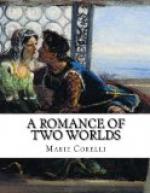I opened my trunk and took out a robe of ivory-tinted crepe. It was made with almost severe simplicity, and was unadorned, save by a soft ruffle of old Mechlin lace round the neck and sleeves. Amy examined it critically.
“Now, you would have looked perfectly ghastly in this last night, when you were as pale and hollow-eyed as a sick nun; but to-night,” and she raised her eyes to my face, “I believe you will do. Don’t you want the bodice cut lower?”
“No, thanks!” I said, smiling. “I will leave that to the portly dowagers—they will expose neck enough for half-a-dozen other women,”
My friend laughed.
“Do as you like,” she returned; “only I see your gown has short sleeves, and I thought you might like a square neck instead of that little simple Greek round. But perhaps it’s better as it is. The stuff is lovely; where did you get it?”
“At one of the London emporiums of Eastern art,” I answered. “My dear, your tea is getting cold.”
She laid the dress on the bed, and in doing so, perceived the antique-looking book with the silver clasps which I had left there.
“What’s this?” she asked, turning it round to discover its name. “‘Letters of a Dead Musician!’ What a shivery title! Is it morbid reading?” “Not at all,” I replied, as I leaned comfortably back in an easy-chair and sipped my tea. “It is a very scholarly, poetical, and picturesque work. Signor Cellini lent it to me; the author was a friend of his.”
Amy looked at me with a knowing and half-serious expression.
“Say now—take care, take care! Aren’t you and Cellini getting to be rather particular friends—something a little beyond the Platonic, eh?”
This notion struck me as so absurd that I laughed heartily. Then, without pausing for one instant to think what I was saying, I answered with amazing readiness and frankness, considering that I really knew nothing about it:
“Why, my dear, Raffaello Cellini is betrothed, and he is a most devoted lover.”
A moment after I had uttered this assertion I was surprised at myself. What authority had I for saying that Cellini was betrothed? What did I know about it? Confused, I endeavoured to find some means of retracting this unfounded and rash remark, but no words of explanation would come to my lips that had been so ready and primed to deliver what might be, for all I knew, a falsehood. Amy did not perceive my embarrassment. She was pleased and interested at the idea of Cellini’s being in love.
“Really!” she exclaimed, “it makes him a more romantic character than ever! Fancy his telling you that he was betrothed! How delightful! I must ask him all about his chosen fair one. But I’m positively thankful it isn’t you, for I’m sure he’s just a little bit off his head. Even this book he has lent you looks like a wizard’s property;” and she fluttered the leaves of the “Dead Musician’s” volume, turning them rapidly over in search of something attractive. Suddenly she paused and cried out: “Why, this is right-down awful! He must have been a regular madman! Just listen!” and she read aloud:




